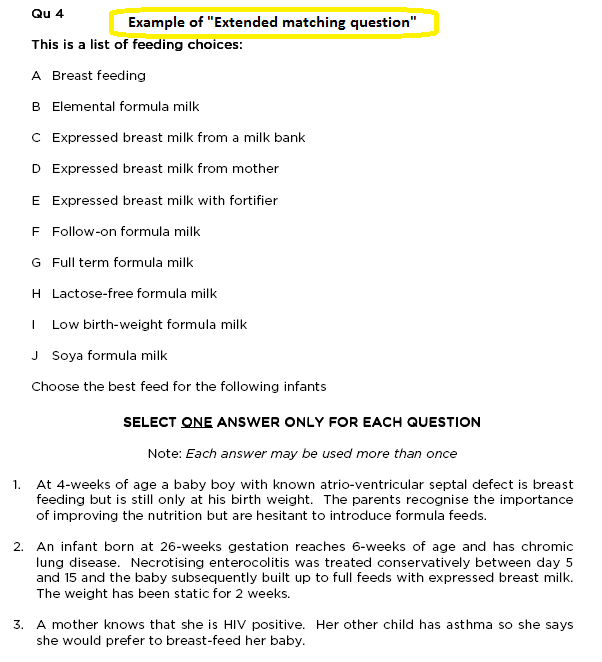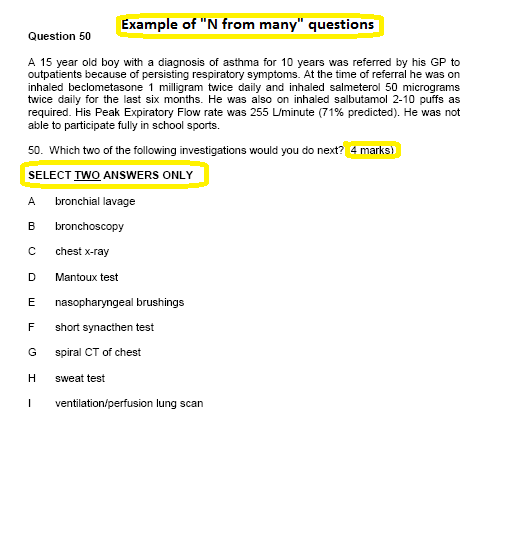MRCPCH Foundation of Practice MRCPCHTheory and Science
Part 1A (Foundation of Practice) The aim of FOP is to assess the candidate's knowledge, understanding and clinical decision making abilities, and ensure they have reached the standard of someone entering their core specialist training. This exam used to be known as the MRCPCH Part 1A. It last for 2.5 hours.
Part 1B (Theory and Science) -- TAS tests the basic scientific, physiological and pharmacological principles upon which clinical practice is based. The format of the examination unchanged.
You may apply to take only FOP/TAS or both parts on the same day. Each paper is 2 ½ hours in length
Answer all questions as there is no negative marking
The pattern of question paper for MRCPCH part 1a and 1b is very clear
10 EMQs (3 statements in each and 3 marks for each statement)
Total marks =10x3x3 =90
0 No more True or false questions
70 Best of Five (BO5) each carry 4 marks=70x4=280
(55%)
(55%)
Total time is 150 minutes. Total items are BO5 (70)+EMQ (10x3=30)=100
Questions cover one aspect of the topic. For example:
- -choose the most likely diagnosis from the following
- -choose the best treatment for each of these children
- -choose the organism which matches most closely each of the following case scenarios.
Question types
Multiple true-false questions (MTFs)
No more True and False
Best of five (BO5)
This section constitute 67% of total marks.
Use to test judgment and experience.
They start with a statement, and are followed by five answers. Some of the answers will be correct, but only one will be the most appropriate answer to the statement. Should only cover one aspect of a topic, so possible questions may be:
· "What is the most likely diagnosis?"
· "Which investigation is most likely to lead to a diagnosis?"
· "What is the best next step?"
· "What is the best advice to give to parents?"
· "What is the most likely pathogenesis of this condition?"
· "What is the most common cause of this?"
As the best of 5 carry the most marks and are more difficult to answer, you should make sure that you complete as many of this question type as possible.
Extended matching questions (EMQ)
it constitute 33% of total marks.
These are similar to best of five questions. In this, a list of 10 possible answers is offered with three statements or clinical scenarios. They should only cover one aspect of the topic, so questions might be:
· Choose the most likely diagnosis from the following.
· Choose the best treatment for each of these children.
· Choose the organism which matches most closely each of the following case scenarios.
Example
Example
Part 2 MRCPCH Applied Knowledge in Practice
Single examination, consists of two papers. You must sit both papers of the examination together.
The format -- combination of 'extended matching', 'best-of-five' and 'n from many' quest ions.
The syllabus unchanged
Consist of two papers, each of 2 and half hours duration.
Each paper will carry approximately the same number of marks.
Candidate's marks will be combined from the two papers to form an overall mark.
Each paper will consist of a mixture of question like Case Histories, Data Interpretation, and Photographic Material.
Question Format
Photographic Material
Each question is based upon printed photographic material. The photographs are prepared from clinical and retinal photographs, radiographs, illustrations of investigation results and occasionally from pathological material. Candidates are asked to identify abnormalities, or provide a diagnosis, to recommend investigation or treatment or a combination of these.
Case History
Each question will be a case history with results of physical examination and investigations and then you will be asked about diagnosis/investigation/management
Data Interpretation
Each question will consist of laboratory data or graphical data, for example electrocardiograms introduced by a short statement of the clinical setting. Candidates are asked for specific points of interpretation.
Note that drugs will be referred to by their UK approved names rather than their trade names. Biochemical and other measurements will be expressed in Sl units (normal ranges or reference ranges will only be provided where these are likely to be in doubt).
Question Structure
'Best of' list questions (Same as BO5)
In this question you are asked to choose the best single answer from a list.
‘N from many' questions
In this question you are asked to choose a number of options from a longer list. For example, signs on a chest X-rays, or the findings on an ECG. Don,t miss to see "select two answers only" or "select three answers only" otherwise you will loose marks.
Extended matching Questions (same as EMQ in part one)
There will be a list of answers or options which is followed by a set of questions or statements.
Examples-
Examples-





i want to know better about exam parts and if it is better to take one or both parts together ,and possible resources
ReplyDeleteDear
ReplyDeleteIt depends, if you are good in pediatrics then you can go for both parts.
Please advice me how many questions you get in each category in each paper at AKP?
ReplyDeleteIs it not necessary to answer all 3 parts?
ReplyDeleteMean?
DeleteThis comment has been removed by the author.
ReplyDeleteWhat is the passing mark/percentage for mrcpch part 1??
ReplyDeleteIt is not fixed but target around 65%. Sometimes I saw less than 60% pass mark too.
DeleteWhat other book should I buy for AKP exam othet than mastercourse, I already have essential revision and pediatric survival guide and i subscribed to pastest for part 2...is this enough or where can i study pictures from??
ReplyDeleteSir
ReplyDeleteHow can I get last 5years question and their answers of fop and tas
Sir
ReplyDeleteHow can I get last 5years question and their answers of fop and tas
This comment has been removed by a blog administrator.
ReplyDelete